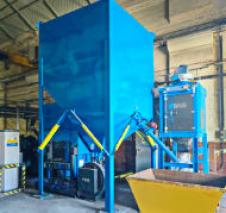 £120K Invested in FMS Sand Recycling at Wallwork Cast Alloys
£120K Invested in FMS Sand Recycling at Wallwork Cast Alloys
Wallwork Group

Lord Street
Bury
Greater Manchester
BL9 0RE
United Kingdom
Motorsport Feels the Heat from New Vacuum Carburise Furnace
To meet demand driven by a growing customer base of motor racing engine and transmission component suppliers, working across all Formulas including F1, Wallwork Heat Treatment have invested in a new advanced vacuum carburise furnace at their Greater Manchester site. This is a significant investment made during Covid challenges and brings the total number of vacuum furnaces across the group's UK locations up to 29, with a total vacuum capacity to process over 40 tons of components per day.
Wallwork director, Simeon Collins, explains, "Motor racing is a punishing environment for metal components. These parts are expensive to manufacture and subject to immense forces. Speed is king but reliability is just as important. Component failure equals failure to finish and can be dangerous. The sector is characterised by rapid development cycles and relies upon equally experienced and responsive heat treatment services."
In addition to hardening, precisely controlled heat treatment of components in the new vacuum carburise furnace will impart many improvements to the metal wear parts so they stand the stresses of continual high speed performance. In a typical process cycle, the metal surface will become free of oxide. This eliminates initial surface wear and enhances resistance to micro cracking which also increases fatigue resistance. Equally important to improving fatigue resistance, is the elimination of oxidation at a granular level, known as inter granular attack.
Many machined components will feature holes. Here the vacuum carburise furnace delivers excellent penetration by pulsing the gas pressure so fresh gas enters the holes frequently throughout the process cycle, ensuring more evenly applied heat treatment for the component.
Advanced machining methods make motor sport components to extremely fine tolerances. Any heat treatment process can cause component distortion, especially as the part is quenched (cooled), the new furnace excels at controlled cooling. As the process takes place in a vacuum chamber the component finish is excellent and takes less time due to the ability to apply higher carburising temperatures. Another time saving benefit is the elimination of the need for component post process cleaning.
Once the correct hardness profile for a metal part has been achieved, it can be stored and reproduced by the furnace to ensure future consistency and quality. Wallwork in-house experts can even help component designers at the design stage. Discussing with the heat treater what properties they need from their component can influence the design so the gains made at the heat treating stage are even greater.
Simeon concluded, "With a dedicated commercial pick-up and delivery fleet of over 50 vehicles, operating from five UK locations, we are ideally placed to provide a nationwide service to meet the rapid development cycles of the motor sport engineering sector. The affordability of the vacuum carburising process means it is not just for the big race teams. Self-funded privateers and smaller teams can also benefit from heat treating components and, if required, Wallwork can go a stage further and apply advance coatings for even greater part performance on track. The UK has a vibrant and world-envied position in engineering for motorsport and everyone wants winning reliability."
More Information
Simeon Collins, Director, Tel. +44 (0)161 797 9111
E-mail: simeon.collins@wallworkht.com Web: www.wallworkht.co.uk
Wallwork Group, Lord Street, Bury, Greater Manchester, BL9 0RE
Release issued: June 2, 2021
Browse Articles
< Previous |
Next >
Wallwork Group News Archive
Halter Inn Works
Holcombe Brook
Bury
Lancashire
BL0 9SA















